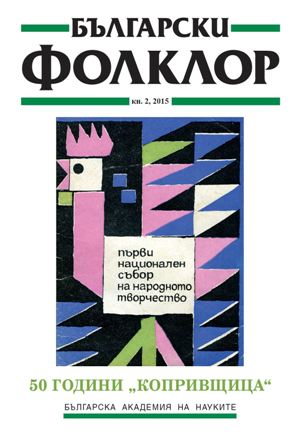И за какво ни е Съборът в Копривщица?
Why Do We Actually Need The Festival of Folklore in Koprivshtitsa
Author(s): Lyuben BotusharovSubject(s): Customs / Folklore
Published by: Институт за етнология и фолклористика с Етнографски музей при БАН
Keywords: festival of folklore; fête; value; traditional culture; exposure
Summary/Abstract: By investigating the origins of the festivals of folklore the author seeks to find an answer to this question which was only recently posed by the specialists in folklore studies. Basing himself on the theory of festivity and on the analysis of the condition of traditional culture in the Bulgarian villages during the 1950s, he comes to the conclusion that the singing competitions/festivals of folklore had come into life as a compensation for the Christianity based village fête, quickly disappearing under the strong pressure of atheism. Folklore itself was part of the rites in traditional culture, but in this particular situation it appeared as consecrated hyper-value changing the transcendental or its sacred substitute. During the festival folklore finds its exposure either as playing the life itself (by the participants who have managed to see the old tradition still functioning) or as an appreciation of artistic heritage (by the generation which learned them later); or as marking of action-concepts – an ideographic type of presentation that follows the structure of the ethnographic description, being at the same time practically synonymous with the idea of the living museum. The core in such cases is to represent the earliest possible layers of traditional heritage and, quite like in the case of the feast, aim at the closest possible following of the act of initial creation. There are two different structures of the festive within the festivals of folklore: from the one hand, the essential, grounding one connected with the scene, which creates the canonical nature of the feast; and, on the otherhand, the aspect of merriment, which belongs to the feast as an excess. The natural loss of most of the bearers of folklore and the drastic decrease of the village population brought forth the necessity of restoration and reconstruction as well. Thus the new conditions of individualization, de-traditionalization and marketing of experience triggered a difficult question: Had traditional heritage (for whose safeguarding the festival of folklore was creates) to be remembered and sanctified as it were or was it to be allowed to turn into a real event and a postmodern form of festal experience?
Journal: Български фолклор
- Issue Year: XLI/2015
- Issue No: 2
- Page Range: 145-147
- Page Count: 30
- Content File-PDF

